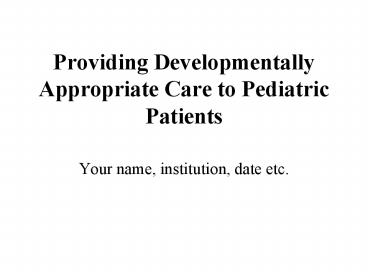Providing Developmentally Appropriate Care to Pediatric Patients - PowerPoint PPT Presentation
1 / 27
Title:
Providing Developmentally Appropriate Care to Pediatric Patients
Description:
Topics of Discussion. Developmental Stages. Child Friendly Interactions ... After age 6 months, infants are afraid of strangers. Toddlers (1-2 years) Physical ... – PowerPoint PPT presentation
Number of Views:166
Avg rating:3.0/5.0
Title: Providing Developmentally Appropriate Care to Pediatric Patients
1
Providing Developmentally Appropriate Care to
Pediatric Patients
- Your name, institution, date etc.
2
Introduction
- State the purpose of the discussion
- Identify yourself
3
Topics of Discussion
- Developmental Stages
- Child Friendly Interactions
- Language Issues
- Area Specific Procedures
- Child Life Specialists and Preparation
4
Developmental Stages
- Infants (0-12 months)
- Toddlers (1-2 years)
- Pre-schoolers (2-5 years)
- School Aged Children (6-10 years)
- Adolescents (11-18 years)
5
Infants (0-12 months)
- Physical
- Totally dependent on adults to meet their needs
- Learning/Psychological
- Learn by use of their senses and through activity
- Enjoys play with people and objects
6
Infants (0-12 months)
- Psycho-social
- Recognizes familiar faces
- Uses crying, body language, and tone of voice to
convey wants/needs - Derives pleasure
- Feeding situations
- Being held or rocked
- Tactile stimulation
7
Infants (0-12 months)
- Fears
- Greatest fear is the fear of separation from
caregiver - After age 6 months, infants are afraid of
strangers
8
Toddlers (1-2 years)
- Physical
- Developing control of body (i.e. walking, toilet
training) - Psycho-social
- Increasing independence
- Enjoys exploring environment in the presence of
the primary caregiver - Stranger anxiety can be great in some toddlers
9
Toddlers (1-2 years)
- Learning/psychological
- Developing a sense of object permanence
- Beginning sense of time
- Magical thinking
- Short attention span
- Follows simple directions
- Increasing vocabulary
10
Toddlers (1-2 years)
- Fears
- Separation
- Loss of control
- Pain
- Altered rituals
- Beginning to relate cause and effect, but no real
concept of fear
11
Preschoolers (3-5 years)
- Physical
- Increasing fine motor skills
- Gross motor skills becoming more coordinated
12
Preschoolers (3-5 years)
- Psycho-social
- Intense need for caregiver when under stress
- Initiates activities rather than just imitating
others - Developing social behavior
- Greater autonomy and independence
- Likes dramatic and imaginative play
13
Preschoolers (3-5 years)
- Learning/Psychological
- Ego-centric view experiences from own
perspective - Increasing vocabulary and clearness of speech
- No logical or abstract thought
- Difficulty distinguishing between reality and
fantasy
14
Preschoolers (3-5 years)
- Fears
- Mutilation
- Loss of control
- Death
- The dark
- May see illness/injury as punishment for bad
behavior (still egocentric)
15
School-age Children (6-10 years)
- Physical
- Increasing fine motor skills
- Psycho-social
- Still needs caregiver in times of stress
- May be unwilling to ask for help
- Successes contribute to positive self-esteem and
self-control - Establishing same sex peer groups
16
School-age Children (6-10 years)
- Learning/Psychological
- Age of accomplishment
- Increasing competence and mastery of new skills
- Beginning of logical thought
- Deductive reasoning develops
- Interested in learning about body functions
- Interprets phrase and idioms at face value
17
School-age Children (6-10 years)
- Fears
- Separation from friends
- Loss of control
- Physical disability
18
Adolescents (11-18 years)
- Physical
- Developing mature sexual orientation
- Psycho-social
- Transition from childhood to adulthood
- Quest for independence can lead to family
dissension - Acutely aware of body appearance and
imperfections - May view illness in terms if change in appearance
and function - Peers are important fro psychological support and
social development
19
Adolescents (11-18 years)
- Learning/Psychological
- Can imagine the consequences of actions and
illness - Concept of time well developed
- Memory fully developed
- Beginning to think about concepts outside own
experiences
20
Adolescents (11-18 years)
- Fears
- Change in appearance
- Dependency
- Loss of control
- Separation from peers
21
Child Friendly Interactions
- Get on the childs level
- Introduce yourself and your role
- Unknown people are threatening
- Only give choices where choices exist
- Do not make promises you cannot keep
- Appearances can be deceiving DONT ASSUME
22
Language Issues
- Be careful of medical terms we take for granted
- You do not have to say it hurts
- Do not use the phrases
- Be a big girl/boy
- Big girls/boys dont cry
- Talk to the patient and explain what you are
doing - Use descriptive words
23
Area Specific Procedures / Real Life
- Give an example or real life anecdote
- Sympathize with the audiences situation if
appropriate - Give area specific guidelines/advice
- Take questions about specific situations
24
Child Life
- Discuss your role and how you can help
- Let staff know when you available and how to
contact you - Discuss possible teaching/preparation tools
25
What This Means
- Add a strong statement that summarizes how you
feel or think about this topic - Summarize key points you want you audience to
remember
26
Next Steps
- Summarize any actions required of your audience
- Summarize any follow up action items required by
you
27
(No Transcript)








![Download ⚡️[EBOOK]❤️ Wong's Essentials of Pediatric Nursing 10th Edition PowerPoint PPT Presentation](https://s3.amazonaws.com/images.powershow.com/10074231.th0.jpg?_=20240708125)






















